Safest Places in Portugal for Solo Female Travelers
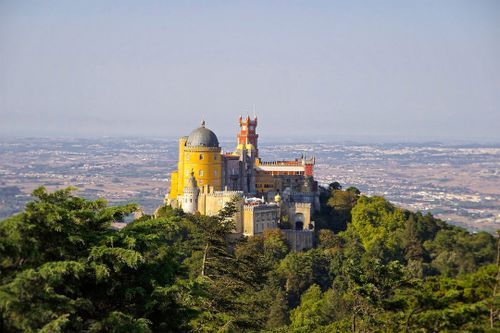
1, Sintra
Nestled in the foothills of Portugal's Sintra Mountains, just a half hour drive from the capital, Lisbon, the picturesque town of Sintra is an alluring blend of natural beauty and rich history. Known for its romantic 19th-century architectures, this UNESCO World Heritage Site is a veritable treasure trove of captivating palaces, mysterious gardens, and ancient castles. Highlights include the pastel-colored Pena Palace, the mysterious Quinta da Regaleira, and the ancient Moorish Castle, which offers breathtaking views from its hilltop vantage point. The charming old town streets are equally inviting, filled with traditional pastries shops and authentic Portuguese restaurants. With its regal hilltop features and surrounding natural beauty, Sintra provides a fairytale backdrop that's perfect for a day trip or an extended stay.
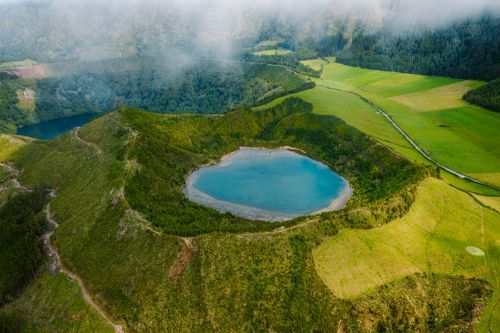
2, Azores
The Azores, a stunning archipelago in the mid-Atlantic, is one of Portugal's best-kept secrets, offering visitors a surreal blend of breathtaking natural landscapes. Composed of nine volcanic islands, the Azores are famed for their lush green terrain interspersed with colorful hydrangea-lined roads, magnificent geysers, sparkling azure lakes and verdant crater fields. The islands also cater to a wide range of adventure activities such as whale watching, diving, hiking and birdwatching. Known as a strong bastion of Portuguese culture, Azores feature charming old towns abundant with historical architecture, local gastronomy, and vibrant festivals. The peaceful, laid-back ambiance and spectacular scenic beauty make Azores a unique travel destination.
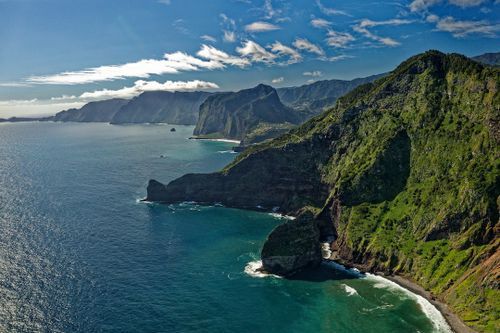
3, Madeira
Madeira is a captivating archipelago that lies in the North Atlantic Ocean, southwest of Portugal, luring tourists around the year with its natural scenery and pleasant climate. This Portuguese gem comprises four islands, with Madeira Island being the largest amongst them. Known as the 'Garden of the Atlantic,' Madeira boasts exotic floral landscapes, lush vineyards, and the unique Laurel forest, a UNESCO World Heritage site. The islands also feature awe-inspiring volcanic geological formations, scenic hiking paths, particularly the levada walks, and the bustling marketplaces 'Mercados dos Lavradores' in the capital city, Funchal. Renowned for its New Year's fireworks display, one of the world's largest, and the fortified Madeira wine, the island is also the birthplace of the football legend, Cristiano Ronaldo. This idyllic archipelago offers a blend of natural enchantment and cultural fascination.
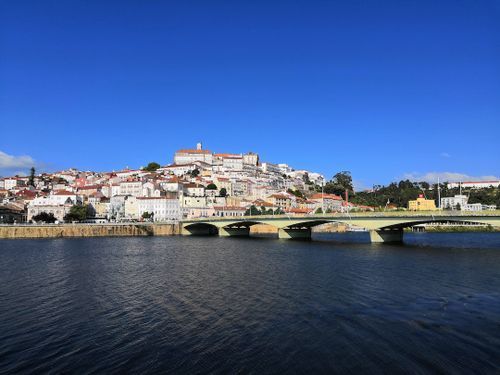
4, Coimbra
Situated in central Portugal, Coimbra sits alluringly along the banks of the Mondego River, offering a treasure trove of historical and cultural gems. Regally known for housing the University of Coimbra, one of the world's oldest academic institutions, the city melds modernity and tradition effortlessly. It is particularly renowned for its preserved medieval old town, relic-filled museums, charming café culture, and Fado music, a melancholic genre of music that speaks deeply of love, pain, and longing. Adding to the allure of Coimbra are the intricately designed gardens and beautiful parks, making it an exceptional mix of natural beauty and historical richness.
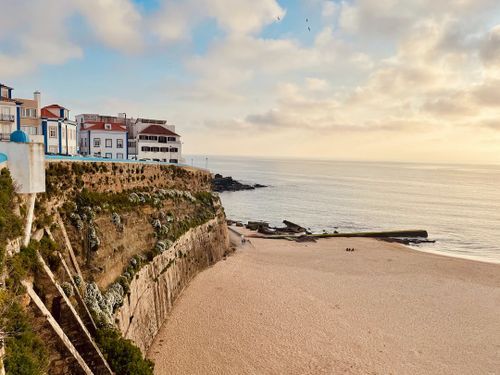
5, Ericeira
Ericeira, located along the Portuguese Atlantic coast, approximately 35 km northwest of Lisbon, is globally acclaimed as a surfing destination. Recognized as a World Surfing Reserve, the first one in Europe, it is well-appreciated for its consistent swells throughout the year and diverse surfing spots such as the Pedra Branca, Reef, Ribeira d'Ilhas and Coxos. Beyond the thriving surf scene, Ericeira charms its visitors with picturesque white and blue-hued traditional houses, narrow cobblestone streets, lush vineyards, and staggering sea views. Renowned for its fresh seafood, restaurants and seaside cafes serve the catch of the day in traditional Portuguese style that food lovers would immensely enjoy. The town’s relaxed atmosphere combined with its local cultural richness make it a must-see destination for travelers wanting to explore the genuine side of Portugal.
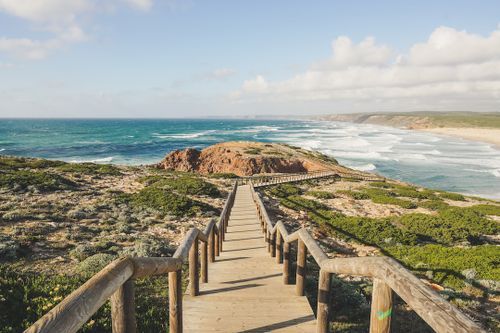
6, Algarve
The Algarve, located on the southernmost region of mainland Portugal, is known for its sunny Mediterranean climate, breathtaking cliffs, golden sandy beaches, and scenic fishing towns. It's an all year round favorite for tourists worldwide due to its idyllic landscapes and the deep turquoise colors of the Atlantic Ocean. It enthralls visitors with its exquisite seafood cuisine, golf courses which are considered among the best in Europe, and the remnants of its Moorish architectural history. Offering a perfect blend of nature's beauty and cultural richness, Algarve is a must-visit spot for every travel enthusiast.
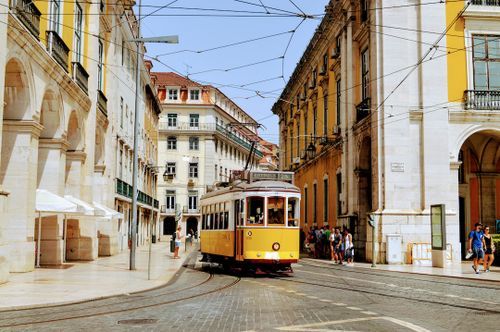
7, Lisbon
Lisbon, the coastal capital city of Portugal, is beautifully situated along the Atlantic coast, bathed in Mediterranean sunlight and blessed with a rich tapestry of cultural and historical attractions. Known for its stunning pastel-colored buildings, ornate architecture, and magnificent hilltop vistas, Lisbon provides a feast for the eyes of every wanderlust traveler. This vibrant city showcases a unique blend of tradition and innovation, with its winding, cobbled alleyways leading to modern hubs of nightlife, shopping and dining. Key highlights include the historic Belém Tower and Jerónimos Monastery, both UNESCO World Heritage Sites, the lively neighbourhood of Bairro Alto, and the iconic 28 tram. Furthermore, Lisbon's gastronomic scene, featuring the infamous custard tarts 'Pasteis de Nata' and fresh seafood, adds another layer to its irresistible charm.
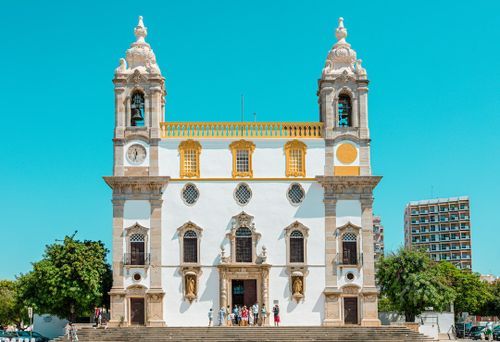
8, Faro
Faro, the charming capital of the Algarve region in Portugal, offers a blend of immersive culture, enchanting natural beauty, and fascinating historical perspectives. Situated on the southernmost tip of the country, bordered by sparkling turquoise waters of the Atlantic Ocean, Faro captivates visitors with its magnetic allure. The city is renowned for its captivating Old Town adorned with cobbled streets and grand monuments such as the neoclassical Arco da Vila. Faro's picturesque marina, cathedral, exquisite seafood restaurants, and atmospheric cafes provide a delightful experience. Not to forget, it is the gateway to the Ria Formosa Natural Park—a haven for bird-watching enthusiasts—and offers vibrant nightlife attracting party-lovers worldwide.
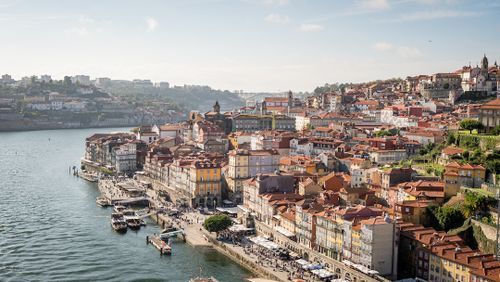
9, Porto
Porto, also known as Oporto, is a coastal city located in northwest Portugal, known for its rich history, charming cobblestone streets, and scenic views, stretching along the Douro River estuary. Famed for its production of fine port wine, this vibrant metropolitan area is teeming with culturally-rich sites such as the Ribeira district, a UNESCO World Heritage Site, filled with medieval relics, narrow paths, and cafes. Its most renowned icon, the Dom Luís I Bridge, provides a panoramic view of the city and its historic port wine cellars that line the river bank. Additionally, Porto is home to the beautiful Livraria Lello, one of the oldest bookstores in Portugal and a spot that inspired J.K. Rowling's depiction of Hogwarts in the Harry Potter series.
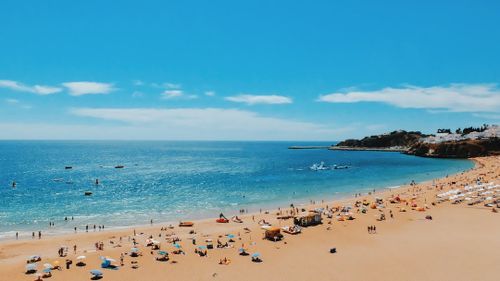
10, Albufeira
Situated in the Algarve region of southern Portugal, Albufeira is an enticing coastal city known for its picturesque golden beaches and clear, turquoise waters. This long-time fishing village turned popular vacation spot draws visitors with its charm through its old town suffused with whitewashed houses and cobblestone streets, lined with restaurants, bars and shops. Albufeira is renowned for its vibrant nightlife, traditional Portuguese gastronomy and stunning sea-cave explorations. The city also boasts various water sports opportunities along the Albufeira Marina and hosts the striking Paderne Castle, a well-preserved 12th-century fortress. Whether it's for relaxation or adventure, Albufeira offers a delightful mix of history, culture, and Mediterranean beach experiences in a warm and sunny climate.
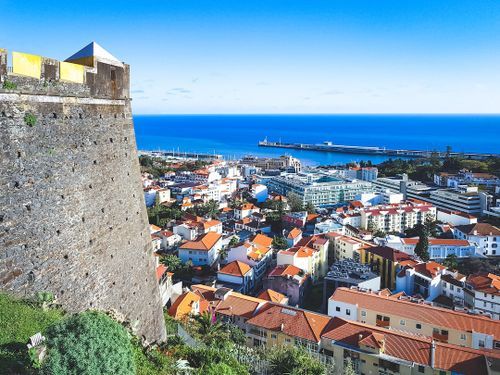
11, Funchal
Funchal, nestled on the sun-drenched southern coastline of Portugal's exotic Madeira Island, beckons travelers with its scintillating blend of natural beauty, cultural wealth, and easy-going Mediterranean charm. Renowned for its terraced landscapes, stunningly beautiful gardens like Monte Palace Tropical Garden and the Madeira Botanical Gardens, Funchal is a horticulturalist's dream. The city effortlessly merges historic, centuries-old structures, exemplified by its captivating Se Cathedral, with modern elements such as the CR7 Museum dedicated to Portugal's football legend - Cristiano Ronaldo, who was born here. Funchal is also famous for its fruits and vegetables market, Mercado dos Lavradores, and its traditional New Year's Eve fireworks display, regarded as one of the world's most extraordinary. In a nutshell, Funchal is the perfect cocktail of relaxing beach life, invigorating mountain hikes, and vibrant city culture – there is something for every travel enthusiast.

12, Braga
Braga, nestled in the northwest part of Portugal, offers a captivating blend of ancient history, rich culture, and vibrant modern life. Known as the religious heart of the country, it boasts an impressive number of churches, the most famous probably being the Bom Jesus do Monte sanctuary. Its cobbled streets are lined with brunch cafes, exquisite eateries, and unique shops that bring the city's old-world charm to life. With its well-preserved remains from Roman times, stunning baroque architecture, and tranquil gardens such as Santa Barbara Garden, Braga is a city that persuasively combines tradition and tranquility with youthful energy and contemporary creativity.

13, Nazare
Nestled along the Atlantic coast of western Portugal, Nazaré is a vibrant seaside resort town renowned for its long sandy stretches, charming old-world streets, and phenomenal seafood cuisine. It is internationally acknowledged for its colossal waves, making it the ultimate destination for thrill-seeker surfers worldwide, thanks to the underwater Nazaré Canyon that creates swells soaring up to 100 feet. Revolving around the iconic Praia de Nazaré Beach, the town offers a compelling cultural tapestry steeped in history represented by its whitewashed houses, the historic Our Lady of Nazaré Sanctuary, and enchanting folk music, dance, and festivals. Whether you're a foodie, beach lover, or adventure enthusiast, Nazaré delivers an unforgettable Portuguese experience.
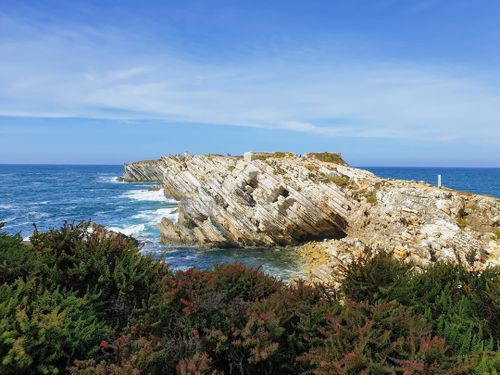
14, Baleal
Baleal, a small island-like region situated off the coast of Portugal's Silver Coast, is renowned for its extraordinary natural beauty. Connected to the mainland by a tombolo, Baleal boasts expansive sandy beaches and clear waters that are a magnet for surfers from all around the globe, earning it a reputation as one of Portugal's premier surfing destinations. Beyond its surfing appeal, the region captivates visitors with its charming fishing village ambiance, presenting an exceptional mix of traditional Portuguese culture, delectable seafood cuisine, and panoramic seascapes. The welcoming local community, mild weather, and action-packed outdoor activities make Baleal a unique destination for an unforgettable sun-soaked adventure.
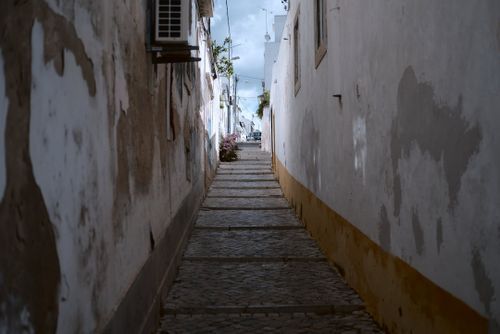
15, Tavira
Tavira is a charming town located on the east coast of Portugal's Algarve region, a wonderland steeped in cultural history and natural beauty. Renowned for its enchanting medieval architecture, Tavira offers a slice of traditional Portuguese life away from the hustle and bustle of the usual tourist traps. It's known for its Roman Bridge, an iconic feature overlooking the Gilão River, as well as the impressive Tavira Castle that offers stunning panoramic views of the town. With its beautiful beaches, such as Praia de Tavira, local cuisine rich in seafood, and the relaxing boat trips around Ria Formosa natural park, Tavira is the perfect getaway for those seeking a quiet escape with a touch of historical exploration.








